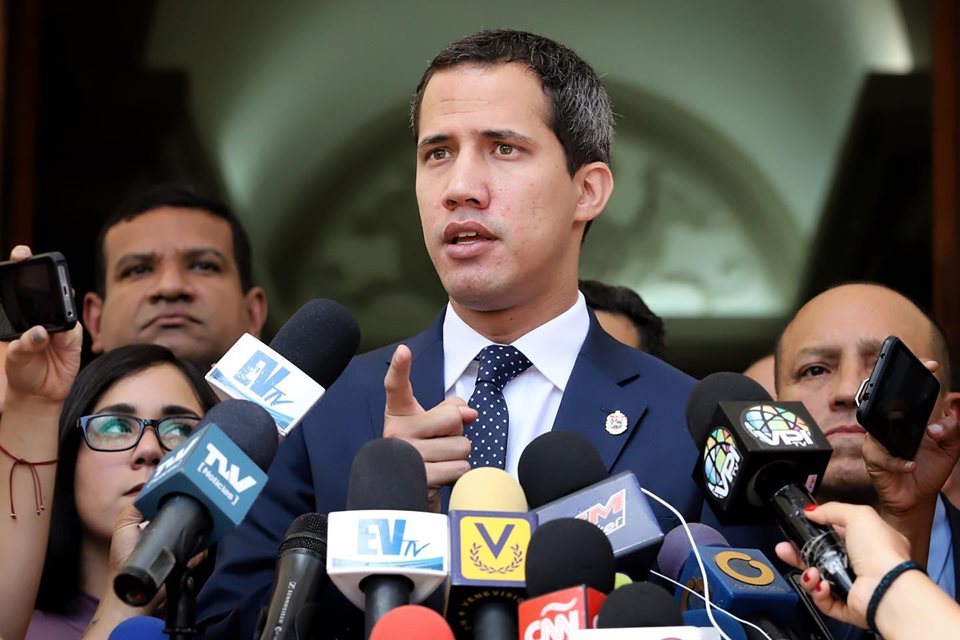
CARACAS, Venezuela — Venezuelan opposition leader Juan Guaido said Friday that opponents of President Nicolas Maduro won’t participate in any early legislative elections he calls amid a protracted power struggle.
Guaido said in an interview with The Associated Press that it would be a “farce” to participate in any election with the Maduro government still in control of the country.
The man recognized by the U.S. as Venezuela’s rightful leader also said the crisis has bitten into Venezuelan’s love of baseball, and he plans to keep the self-claimed title of “acting president” even after his one-year term as leader of the opposition-controlled National Assembly ends in the new year.
“We are very clear that we’re going to continue until the point that elections in Venezuela are in reality free,” Guaido said. He contended there are signs Maduro’s government is weakening, alleging it is resorting to torturing opponents while growing isolated from its people and the international community.
Socialist party chief Diosdado Cabello, a key Maduro ally, has said elections for the National Assembly — the most important opposition-dominated institution in Venezuela — could be held in January or earlier. The legislature’s five-year term is set to end in December 2020 and elections are traditionally held in the last month of its term.
Elections will be held “soon,” Cabello said. “Sooner than people think.”
Guaido launched a campaign to overthrow Maduro upon being named head of the National Assembly earlier this year. He quickly won recognition from more than 50 foreign governments, led by the Trump administration. They consider the socialist Maduro’s re-election last year a fraud, in large part because leading opposition parties and candidates were banned from running. They argue that the presidency should fall to the head of congress.
However, Maduro refuses to budge from power with backing from the Venezuelan military and international allies such as Cuba, Russia, China and Turkey. Maduro, the late President Hugo Chavez’s hand-picked successor, often calls Guaido a puppet of a U.S. government bent on stealing Venezuela’s vast oil resources.
Many saw recent talks hosted by Norway on the Caribbean island of Barbados between the Maduro government and its opposition as Venezuela’s best chance at resolving the crisis. But the U.S. unveiled a new round of harsh sanctions this month, which prompted Maduro to pull out.
As the political and economic crisis deepens, an estimated 4 million Venezuelans have fled the country since 2015 seeking relief from instability and shortages of food and medicine.
Maduro’s opponents view moving up elections as a way for him to take control of the last major institution not held by the ruling party, accusing the government of rigging the election system.
“That’s not an election,” Guaido said. “It’s a new bunker for them in an attempt to justify all the bad things they’ve done politically in the past.”
As tough new U.S. sanctions targeting Maduro’s government kick in, the effects are starting to become evident. Major League Baseball announced Thursday it is barring players from participating in the upcoming Venezuelan Winter League as a result.
Guaido, a baseball fan himself, said he laments that Venezuelan families will be seeing fewer MLB players on the field, though he noted that their participation had already been declining amid security issues and other concerns.
He said he hopes Venezuela reaches a solution soon so that they can return.
“It’s not the sanctions,” he said. “It’s the grave situation the country is in.”
Guaido, however, says he remains upbeat for the possibility of change, and believes Maduro’s government will soon return to negotiations hosted by Norway, because it has no other options.
He reiterated that “all strategies are necessary” for change and said the opposition was “absolutely informed” of contacts between the U.S. and Maduro government recently reported by The Associated Press .
Diego Moya-Ocampos, a Venezuela analyst with the London-based consulting firm IHS Markit of Latin America, said it would be no surprise for Venezuela’s opposition to shun participating in elections under Maduro’s rule, as it has done before. If Maduro called an early legislative vote, it would likely close the door to a negotiated solution.
“It would simply remove the last democratically elected institution in the country,” Moya-Ocampos said.
Many analysts say they expect the countries that recognize Guaido will continue to do so even after his term as head of congress ends in December.
“He has established himself as the leader of the opposition,” said Phil Gunson, a Caracas-based analyst for the International Crisis Group. “And no substitute is likely to have the same authority.”
———
Associated Press writer Christine Armario in Bogota, Colombia, contributed to this report.